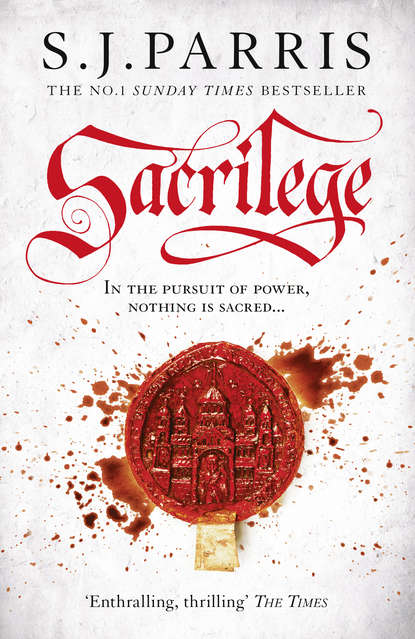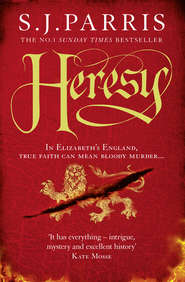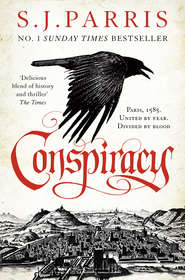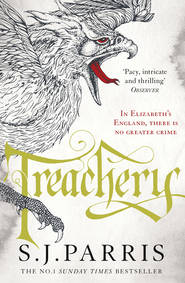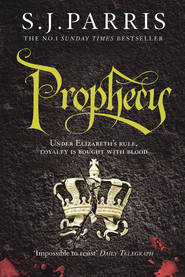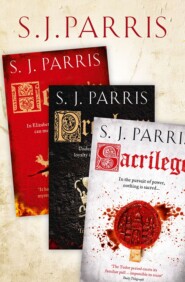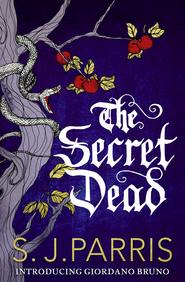По всем вопросам обращайтесь на: info@litportal.ru
(©) 2003-2024.
✖
Sacrilege
Автор
Год написания книги
2019
Настройки чтения
Размер шрифта
Высота строк
Поля
‘Well then, don’t make the same mistake twice,’ he said, matter-of-factly. ‘I will work on Walsingham. But be prepared to find yourself hunting for the corpse of a dead saint as well as a murderer.’
‘Since I seem to have a knack of stumbling over corpses wherever I turn, perhaps I am the man for the job,’ I said. But again the similarity between Sophia’s words and Sidney’s pricked at my thoughts, and I pictured the dead man’s brains spilling out of his shattered skull across the worn flagstones.
I hoped Sidney’s optimism was well founded. Their story about the secret cult of Saint Thomas had piqued my interest in the city of Canterbury yet further, but above all I wanted to visit Sophia at the tavern that evening with good news, to see the colour in her face and hope in her eyes. Two impossible tasks – to find a dead saint and a living murderer – but, as Sidney said, it was better than sitting idle, waiting for fate to unfold its design around you.
CANTERBURY (#ulink_0d48a227-a129-5f9e-8c3e-4795e65b221b)
FOUR (#ulink_84f1ad3c-4ea8-594d-909f-8d18e2293918)
The road out of London towards Kent, known as Watling Street, was still busy with traders and drovers, though the traffic of pilgrims had long since stopped. We set out early, but weeks without rain had baked the unpaved track hard as stone and before we had even reached Southwark my eyes and throat were stinging from the clouds of dust flung up by hooves and cartwheels. Every traveller we passed wore a cloth tied around his or her mouth and nose, and I resolved to buy something similar in whichever town we came to next.
Sophia rode beside me, the peak of her cap pulled low over her face. She had barely spoken since we set out and, though I could see little of her expression, the tense line of her jaw betrayed her anxiety at the journey we were now undertaking. Perhaps, after pinning so much hope on its outcome, she had finally begun to appreciate the grave danger she would face when she rode back through the gates of the city that wanted her arrested for murder. Now and again she would clear her throat and I would turn expectantly, waiting for her to speak, but she would only smile wearily and indicate the dust.
I had hired two strong horses at considerable expense, paid for partly out of the purse Walsingham had sent to cover my stay in Canterbury. Eventually he had relented, according to the messenger who had been waiting for me in the street outside the embassy with an encrypted letter two days after my visit to Barn Elms. In it Walsingham had included a fully stamped travel licence, without which I would risk arrest for vagrancy, and instructions that I was not to travel under my own name, nor was I to reveal it under any circumstances to anyone in Canterbury except Harry Robinson.
My host, the French Ambassador, had been reluctant to let me go, but he acknowledged that he had no power to forbid me from travelling, since I did so (he believed) at his sovereign’s expense. He bade me farewell with genuine affection and regret in the midst of his own arrangements for moving the embassy household to the countryside, and I felt a pang of sadness at leaving, though it was outweighed by the delight on Sophia’s face as she flung her arms around my neck when I told her the news.
Now she was riding at my side as the sun climbed higher into a sky of untouched blue and the road stretched out before us, and I could not suppress a swelling sense of anticipation. Sophia’s future depended on the outcome of this journey; if I could clear her of the charges of murder, I could also clear my own conscience of the guilt that had hung heavy on any thought of her since the events in Oxford. Freed of these burdens, might we not begin again, as if on a fresh page?
There was also the prospect, after almost a year spent at a desk buried in books and astronomical charts, of proving my worth again to Walsingham and the Queen. The goodwill of princes was fickle, as every courtier knew, and an ambassador could be recalled or expelled at a moment’s notice. I was certain that my own best prospects, if I wanted to go on writing my books without fear of the Inquisition, lay at the court of England, not France, but to ensure myself a future there I needed Walsingham to value me for my own skills and not merely for my useful connection to the French embassy.
Sophia’s horse gave an impatient little whinny and tossed its mane, making her start in the saddle. I turned, but she recovered her poise and purposefully ignored my expression of concern, her eyes fixed on the road. She rode competently enough, though she looked uncomfortable astride the horse, her long legs pressed tightly against its sides. I tried not to dwell on this thought. She was unused to riding like a man, I supposed, and the stiffness of her posture in the saddle could give her away. One more small trap to avoid, if her boy’s disguise were to hold up. I concentrated my gaze again on the tips of my horse’s ears. There would be danger in this for both of us; I was not so caught up in dreams of adventure as to pretend otherwise. If Sophia was recognised within the city walls of Canterbury, she would be arrested to await trial for her husband’s murder, and if my search for the evidence to vindicate her did not succeed before the assizes, she would face certain execution. There were other dangers too; if the real killer was still in the city and thought he had escaped blame, he would not thank a stranger for asking awkward questions. Anyone who could strike a man down with such force that his brains spilled over the ground would surely not hesitate to dispatch those who seemed overly curious. And as for the legend of Becket’s corpse, I could not help but remember that my last attempt to infiltrate the underground Catholic resistance had very nearly ended fatally.
The one consolation was that no one knew me in Canterbury; I was free to present myself in any guise I chose. At my belt I wore a purse of money, with another inside my riding boots and another wrapped in linen shirts in the panniers slung over my saddle. Across my back I carried a leather satchel containing my travel licence and a letter sealed in thick crimson wax with Sidney’s coat of arms, recommending me as a visiting scholar to his former tutor, the Reverend Doctor Harry Robinson, and requesting that he make me welcome during my stay in Canterbury. The letter was a cover, naturally, in case I needed to explain myself to any inquisitive authorities along the road. Robinson had never been Sidney’s tutor, though he was apparently acquainted with the family of Sidney’s mother, but the Sidney coat of arms ought to be sufficient protection against the bullying of petty officials. So that I might travel anonymously if I should be searched, Walsingham had sent a fast rider ahead to Harry Robinson two days earlier with an encrypted letter explaining who I was and the true nature of my business in Canterbury, and requesting Doctor Robinson to assist me for Walsingham’s sake as best he could.
What I was to do with Sophia was another matter, I thought, glancing over at her as she rode, head bowed, teeth gritted. I had omitted to mention to either Walsingham or Sidney that I was planning to take her to Canterbury with me – I already knew all the arguments they would make against such folly. My belt held a sheath for the bone-handled knife that had saved my life more than once, and which a more superstitious man might have been tempted to regard as a good-luck charm.
The low, whitewashed taverns and brothels of Southwark, London’s most lawless borough, ended abruptly and beyond them the horizon opened up into a wide vista of drained marshland converted to fields now parched yellow, the Kent road threading through the bleached landscape, lost in the shimmering distance. As soon as we left the narrow streets behind, the fetid smells of the city receded, to be replaced by the ripe scents of baking earth and warm grass. Despite the dust, I inhaled deeply, tasting for the first time in weeks air that was not thick with the stench of rot and sewage. Swallows looped patterns in the empty sky. Out here, the birdsong was loud and insistent, with a joyful lilt in its cadences, so different from the shrilling of gulls that I had grown used to, living so near the river. Along the way we passed travellers heading in the same direction, many with mules or carts piled with what looked like domestic possessions, and children precariously balanced on top – families fleeing the threat of plague.
‘Where will they go?’ Sophia wondered, as we passed one straggling group with a small donkey-cart and several barefoot children who stared up at us with watchful expressions. One of the older children held a baby in its lap, and I saw Sophia’s eyes latch on to it. She spoke so quietly she might almost have been talking to herself.
‘To relatives, I suppose.’
‘What if their relatives will not take them in? Coming from a plague city?’
I shrugged. ‘Then they will have no choice but to return to London, I imagine.’
‘To the plague,’ she whispered, barely audible. She appeared stricken; I watched her for a moment as she turned back to take a last look at the child and the baby. She has a new understanding of what it means to be a refugee, I thought, a raw sympathy with the desperate, those who must throw themselves on the mercy of others. I remembered my own early days as a fugitive on the road to Rome and then north through Italy; how quickly I was exposed to the best and worst of human nature at close quarters. I was taught to survive by bitter experience, but I learned more about compassion in those months than I ever did in thirteen years of prayer and study as a Dominican monk.
‘No one has yet seen any sign of plague,’ I reminded her.
Sophia turned to me with a distant smile, as if seeing me properly for the first time since we had set out.
‘So you would not believe there is plague in London until you see a man fall dead of it at your feet, is that it?’
‘I would ask for some proof beyond marketplace rumour, if that’s what you mean.’
‘And yet you will believe that the Earth goes around the Sun, and that the fixed stars are not fixed, and the universe is infinite, full of other worlds, all with their own suns? Where is your proof for that?’
‘There are calculations based on measurements of the stars –’ I began, until I noticed the smile of amusement playing at the corners of her lips. Her chin jutted defiantly. ‘Very well, you are right – I have no firm proof that there are other worlds. The question is, rather, why should we assume there are not? Is it not arrogance to think we are the only creatures in the cosmos who know how to look up at the night sky and consider our place in it?’
‘The holy scriptures say nothing about any distant worlds.’
‘The holy scriptures were written by men. If there are people who inhabit other worlds out there –’ I gestured with one hand – ‘it is reasonable to suppose they would have their own writings, no? Perhaps their books have no mention of us.’
She smiled, shading her eyes with one hand as she turned to look at me.
‘Have you put all this in your book for the Queen?’
‘Not all, no.’
‘Just as well.’
She laughed briefly before retreating into her pensive silence again, but there had been warmth in that laughter. The brief exchange had offered a glimpse of the old Sophia, as if she had thrown me a scrap of what I had hoped for from this journey, the conversations we had known in Oxford, when I had sensed she wanted to sharpen her intellect against mine. Perhaps I had been a fool to imagine we would have the leisure for that kind of talk, with such a burden weighing on her shoulders. But to a hungry man, even a scrap is enough to quicken his appetite.
By evening we had reached the small market town of Dartford. As if sensing an end to the journey, the horses slowed their pace along the main street as I scanned the painted signs that hung immobile from the eaves of low timber-framed buildings in search of a suitable inn. The fierce heat of the day had begun to subside, but the air remained heavy and it was a welcome relief to ride into the shade of houses. At the end of the high street we found an inn that must have stood in that spot beside the river for more than a century; I pictured generations of long-dead pilgrims pressing through the wide gates into its yard, footsore and dry-throated, hoping desperately – as was I – that there would be a room.
I pulled my horse gently to a halt outside the gate and turned to Sophia. She had remained unusually quiet through the afternoon’s long hours of riding as the sun hammered down, the road affording little respite except for the few brief stretches where we passed between copses of beech trees. Now she raised her head to reveal a face streaked with dirt and sweat, lips crusted with the dust of the road.
‘Don’t clean yourself up too much,’ I remarked, quietly. ‘You look more like a boy with all that filth on you.’
She rubbed the back of one hand across her mouth. ‘I must smell appalling.’
‘No worse than any other traveller in here.’
My body ached from the ride, my thighs, back and behind sore and stiff from the hours in the saddle, but Sophia had not uttered a word of complaint, though I knew she was unused to riding and I had noticed in the last hour of our journey how she winced whenever she shifted position. My horse gave a little jog on the spot and whinnied with impatience; perhaps he could smell fresh hay from the inn yard. I looked down at my hands on the reins for a moment, then back at Sophia. There was one subject I had not dared to broach with her on the journey, but it could not be avoided any longer.
‘I fear we will have to share a room tonight.’ I had not meant to state it so baldly, but there was no point in being coy. She appeared not the least surprised by this; her expression, beneath the dust, seemed unperturbed.
‘I know.’
‘Because you are travelling as my servant, you see, and it would arouse suspicion if we did not,’ I continued, speaking too fast. ‘Besides –’ I tapped the purse at my belt – ‘we must use our money wisely. We don’t know how long we will need to make it last.’
Sophia nodded, as if all this had been understood and agreed; her calm only made me more flustered. It also brought a sharp pang of rejection; I realised that, for her, the prospect of sharing a room carried none of the implications it held for me. I looked away, sizing up the inn, scratching the damp hair at the back of my neck until I was sure my eyes would not betray me.
‘We must take great care from now on, especially in the company of strangers,’ I said, lowering my voice. ‘There may be people on the road looking for you, and we do not know if a reward has been offered in Canterbury for your capture. And your disguise is flimsy, to say the least.’ I looked her up and down. ‘The best thing you can do is to speak as little as possible. Your voice is more likely to give you away than anything. You can always pretend to be simple.’
She smiled, and rolled her shoulders back to ease the stiffness.
‘And you, Bruno, must remember to call me Kit. And don’t keep looking at me the way a man looks at a woman. If anything is likely to give us away, it is you.’ She wagged a finger, pretending to chide, but I did not laugh. So she had noticed how I looked at her. Was she as indifferent to that as she sounded, or was she simply better at being practical than I in this situation, as women so often are? ‘Try to forget you ever knew me as Sophia,’ she whispered, glancing around to make sure no one could overhear. ‘You must think of me as a boy all the time now.’
‘I will do my best. Though you must understand, I don’t find that easy.’
She smiled again, and behind the exhaustion and the dirt I saw a gleam in those amber eyes that might have been an acknowledgement of my meaning.
‘You had better call me by another name too,’ I added, shifting my weight in the saddle to ease my back. ‘I travel as Filippo Savolino, scholar of Padua.’
‘Why? Do you think your fame has reached as far as Canterbury?’ The corners of her mouth twitched in amusement.





